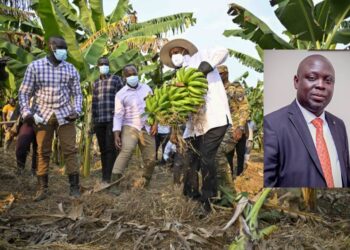Every year on 9th, October Uganda marks a significant moment in its history, the Independence Day. This day not only symbolizes freedom from colonial rule but also presents an opportunity for reflection, celebration, and progress as the nation prepares to commemorate its sovereignty, there is a need to advocates for a transformative approach to every year’s festivities introducing a nationwide tree planting campaign throughout the Independence Week.
As the world grapples with environmental challenges, deforestation emerges as a critical concern. Current statistics reveal that one football field of forest is lost every second globally, posing a significant threat to biodiversity, climate stability, and the livelihoods of millions. In Uganda, where approximately 12% of the land is forested, the impacts of deforestation are felt acutely, threatening local ecosystems and contributing to climate change.
The proposed Independence Week tree planting initiative aims to harness the spirit of unity and patriotism synonymous with Uganda’s independence celebration. By mobilizing communities across the nation to plant trees, this initiative could make a powerful statement about the country’s commitment to environmental conservation and sustainability.
With a network of 159,366 kilometers of roads across Uganda, road reserves present a unique opportunity for tree planting. These areas, often neglected, can serve as critical green belts that absorb carbon, mitigate soil erosion, and enhance the overall aesthetic and ecological health of the landscape. Additionally, public institutional land, including schools, hospitals, District headquarter land and others can play a vital role in this initiative, offering further spaces for tree planting while fostering a culture of environmental awareness among the population.
The tree planting campaign can become a nationwide movement, uniting people of all ages and backgrounds, Local government institutions, schools, NGOs, and community groups can coordinate efforts to organize tree planting events, encouraging active participation from citizens. Such an initiative not only nurtures community spirit but also educates participants about the importance of trees in combating climate change and maintaining ecological balance as well as recovering our 15% of the National forest loss.
Moreover, the economic implications are significant. By planting trees, Uganda can promote agroforestry practices that yield fruit, timber, and medicinal resources. This contributes to local economies, improves food security, and provides sustainable livelihoods for families, schools and religious institutions involved in tree cultivation and care.
Implementing an Independence Week tree planting initiative could set a precedent for other nations in East Africa and beyond facing similar environmental challenges. It emphasizes the critical link between national identity and a commitment to safeguarding natural resources. As Uganda celebrates its independence every 9th, of October it can lead by example, showing that true freedom includes responsibility for preserving the environment.
Within the week prior to 9th, of October as Ugandans gather to celebrate their hard fought independence, let them also commit to nurturing the land that sustains them and a generation to come. The proposed tree planting initiative serves as a powerful reminder that the health of the environment is intertwined with the nation’s prosperity and resilience.
By coming together to plant trees during Independence Week, Uganda can honor its past while cultivating a greener, more sustainable future. Now is the time to plant the seeds of change, ensuring that future generations inherit a thriving, diverse, and flourishing Uganda. As the nation celebrates free from colonial rule, let it also embrace the opportunity to give back to the earth that has nourished its people for generations.
The author is a Social Development specialist and CEO Bridge Your Mind Centre
Email; bwani.jose@gmail.com
Do you have a story in your community or an opinion to share with us: Email us at editorial@watchdoguganda.com













